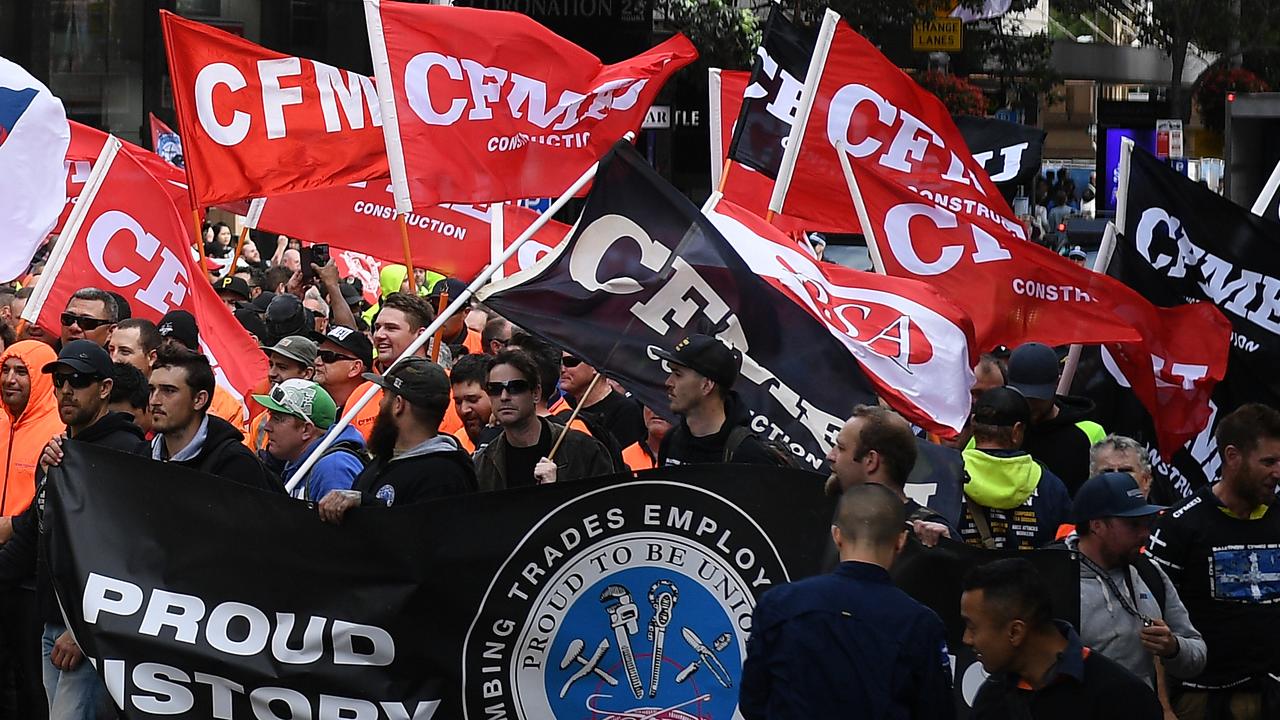1000 crimes on building sites
Government to use evidence of rising “lawlessness” on building sites for fresh attack on CFMEU influence on the ALP.

The Turnbull government will today use evidence of rising “lawlessness” and union militancy on building sites revealed in the industry watchdog’s latest annual report to launch a fresh attack over the CFMEU’s influence on Bill Shorten and the Australian Labor Party.
The Fair Work Building Industry Inspectorate investigated almost 1000 breaches of federal workplace laws in the year to June — overwhelmingly by Construction Forestry Mining and Energy Union officials — and its report cites “alarming rates” of lawlessness and an “increasing battle” against the militant union.
Penalties levelled against unionists by the courts for right-of-entry breaches jumped tenfold in 2014-15, and those imposed for coercion jumped 64 per cent. There was a 50 per cent rise in legal action, mostly directed at the CFMEU, the report states, noting that Queensland was a “hotspot” for new complaints.
Employment Minister Michaelia Cash said yesterday that the Fair Work Building and Construction report, to be tabled in federal parliament today, “further confirms the disturbing reality that has been obvious in the building industry for far too long”.
“The independent regulator, the courts and the police have all expressed their serious concerns about the CFMEU’s culture of contempt for the law,” Senator Cash told The Australian.
“This is the same union that Bill Shorten relies on for his leadership and who the Labor Party relies on for their policy direction.”
Unlawful behaviour resulted in higher infrastructure costs, delayed projects, lost jobs, lost opportunities and stalled growth, she added. “We must end the ingrained culture of fear and intimidation.”
In his forward statement to the report, inspectorate head Nigel Hadgkiss says: “I regret to report that the 2014-15 financial year has been marked by alarming rates of lawlessness in the building and construction industry.
“I believe the contents of this annual report demonstrate two important points: firstly that the rule of law is severely lacking in the industry; and secondly, that the agency is doing all it can within its jurisdiction and means to curb that lawlessness.”
Mr Hadgkiss says the agency is “winning many battles in court against unlawful behaviour but we are not winning the war to stamp out this unlawfulness or the notion by some participants that it is acceptable to break the law in this industry — it is not.”
The FWBC report reveals the agency has been instrumental in supplying material to the trade union royal commission, referring more than 125 incidents dating back to 2006 to the inquiry.
The commission requested further details for about half of those matters.
Of the 948 breaches of commonwealth workplace laws investigated by the FWBC in 2014-15 — up from 890 the previous year — 40 per cent were contraventions of right-of-entry laws, with freedom of association, unlawful industrial action and coercion the “other significant” areas.
Penalties imposed as a result of FWBC litigation in 2014-15 totalled $1.4 million — the fourth year that penalties yielded by the agency and its predecessors topped $1m.
Overall, new investigations fell from 327 in 2013-14 to 197, as the FWBC referred more complaints about wages and conditions to the Fair Work Ombudsman to focus on “core” activities such as unlawful industrial action, coercion and right-of-entry breaches.
Yet the number of new investigations in Queensland rose as the state remained dominated by “hot spots” of unlawful industrial action, leading the agency to redeploy staff to Brisbane.
The number of legal cases commenced rose to a record.
The FWBC intervened 26 separate times in the past year in Fair Work Commission decisions on issuing right-of-entry permits for union officials.
It received more than 3000 requests for assistance, with more than 2000 coming through the agency’s 1800 hotline.
The agency also relied heavily on hard-won compulsory examination powers, which Mr Hadgkiss said had become a “critical tool in breaking down the walls of silence in the industry”. The report notes that the government extended the agency’s compulsory powers for two years before they were due to expire in May. The government is likely to use the findings in the report to bolster its case in its battle to restore the more powerful Australian Building and Construction Commission, which held tougher penalties, after its legislation was blocked in the Senate.
Mr Hadgkiss quotes Federal Court judge John Logan’s June decision against the CFMEU that notes that an industrial organisation persistently “engaging in unlawful conduct cannot expect to remain registered”.



